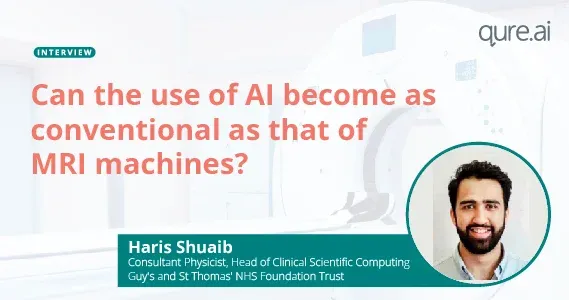Haris Shuaib, Head of Clinical Scientific Computing at Guy’s and St Thomas’ NHS Foundation Trust hopes so. In a freewheeling conversation with Reena Rajan, Head of Marketing at Qure.ai, they touch upon facilitating technology into the healthcare workflow and how a boring walk triggered the London Medical Imaging & Artificial Intelligence Centre for Value Based Healthcare’s AIDE initiative that’s currently being used for Stroke care and Neonatal care. Haris also discusses how the partnership with Qure.ai is a way to demonstrate how AI solutions can have meaningful impact in hospital ops and patient outcomes and the endless potential applications of AI in healthcare.
Back
A boring hospital corridor walk sparked what would become a groundbreaking healthcare AI initiative. In an engaging conversation with Reena Rajan of Qure.ai, Haris Shuaib, Head of Clinical Scientific Computing at Guy's and St Thomas' NHS Foundation Trust, reveals how his reluctance to walk between two connected hospitals led to transformative change in healthcare technology.
Five years ago, as a trainee seeking a way to transfer scanner data for analysis, Shuaib wrote a simple automation program. This seemingly modest solution caught his colleagues' attention, who saw potential for their own analytical needs. That small efficiency tool evolved into AIDE, now a major Office of Life Sciences-funded program spanning 10 teaching hospitals across London and the southeast. Built on free, open-source technology, this platform has become a comprehensive solution for integrating AI into clinical workflows securely and efficiently.
As Transformation Lead for the London AI Centre, Shuaib's work extends far beyond the original automation tool. His team tackles the complex challenge of translating cutting-edge technology into practical healthcare solutions. This involves comprehensive staff training, developing robust policies that align with national regulations, and ensuring new technologies enhance rather than disrupt existing care pathways. The goal is seamless integration that benefits both healthcare providers and patients.
The partnership with Qure.ai, established through the NHS XAI award, represents a crucial step forward in demonstrating AI's real-world impact. While AI solutions have shown impressive results in academic papers - including Qure.ai's publications in The Lancet - Shuaib emphasizes the need to prove their practical value to commissioners. The focus now is on demonstrating tangible improvements in hospital operations and patient outcomes, moving beyond technical validation to meaningful implementation at scale.
The applications already in place show promising diversity. At King's College Hospital, AI assists with stroke care, while at Guy's and St Thomas', the focus includes neonatal care applications. But this is just the beginning. Shuaib envisions AI applications expanding into numerous areas: early detection of brain tumors, tumor differentiation, addressing COVID-19 backlogs, optimizing surgery times, and managing waiting lists. The potential seems boundless, though he cautions that meaningful healthcare transformation takes time and requires close collaboration between technology providers and medical professionals.
Perhaps most intriguingly, Shuaib's ultimate vision for AI in healthcare is surprisingly modest: he wants it to become as unremarkable as an MRI machine. Despite the quantum mechanics behind magnetic resonance imaging being revolutionary, MRI machines are now simply part of routine healthcare - reliable, trusted, and unexciting to all except the technologists who truly understand their complexity. 'Only the technologists should know how cool it really is,' he says, looking forward to the day when AI in healthcare becomes wonderfully ordinary - a standard tool that quietly saves lives and improves care without fanfare.
This vision of normalized excellence represents a mature approach to healthcare technology - where innovation is measured not by its novelty, but by its reliable service to patient care. Through initiatives like AIDE and partnerships with companies like Qure.ai, Shuaib and his team are steadily working toward this future, one automated process at a time.
(LINK TO FULL CHAT)
(LINK TO FULL CHAT)
